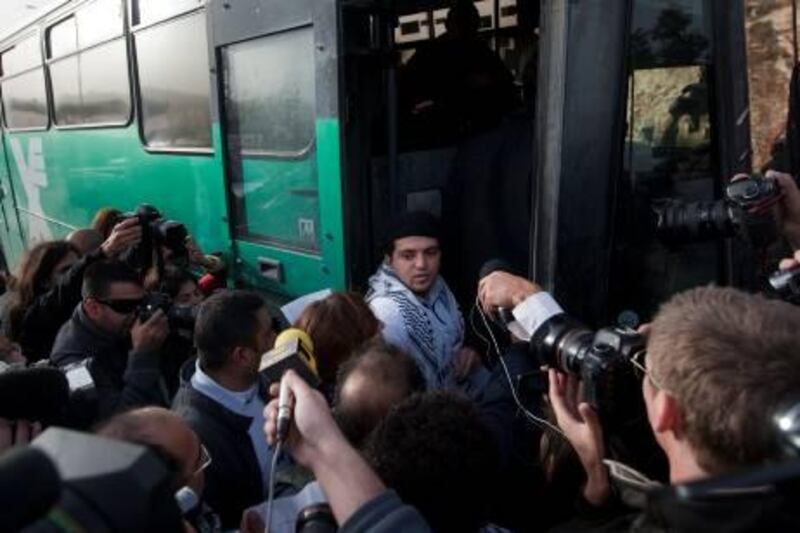HIGHWAY 60, WEST BANK // When Bassil Arraj began planning his freedom ride months ago, little did he realise that he would be at the centre of a media frenzy.
But there he was yesterday, swarmed by dozens of journalists as he and five other activists tried something that few, if any, West Bank Palestinians ever do - ride a bus full of Jewish settlers.
"I'm so excited! I'm going to Jerusalem!" exclaimed the 27-year-old trained pharmacist, who was standing at a settler bus stop just off Highway 60 in the West Bank.
Calling themselves the Freedom Riders, these twenty-something Palestinians sought to highlight the segregation that is institutionalised under Israeli occupation by modelling their demonstrations along the same lines as civil-rights campaigners in 1960s America.
"Jim Crow south!" is how Mr Arraj explained conditions for Palestinians in the West Bank. That was a reference to defunct laws in the United States that instutionalised segregation between blacks and whites.
By early evening, the demonstrators had boarded a bus headed towards Jerusalem even though they lacked Israeli permits to enter the city. They refused requests by security personnel to exit the vehicle when they had reached the checkpoint blocking the city and at least five were then arrested by police.
It all had an air of Rosa Parks, who gained iconic stature for refusing in 1955 to obey America's segregationist rules and sit at the back of a bus in Montgomery, Alabama, with the rest of the African-Americans.
And that was the point, according to the protest organiser. Their loosely knit group of Palestinian-rights campaigners hoped to publicise a taboo of Israel's military control over the West Bank that, in practice, prevents Palestinians from sharing buses with Jews.
Legally, Palestinians are not forbidden from riding buses for Jews in the West Bank. They instead have their own lines that navigate the area's Swiss cheese of cantons that separate Israeli areas from Palestinians ones.
These differing population arrangements that stem from Israel-Palestinian peace accords of the 1990s help form the legal underpinnings that bar Palestinians from entering Israel and the roughly 120 Jewish settlements in the West Bank, and which practically deny Palestinian access to the buses.
All too often, Palestinians who do approach settlements without permission are beaten, arrested - or both. These were the sort of risks that Huwaida Arraf, 35, one of the activists, expected before she boarded the Jerusalem-bound bus.
"In the end, all this will only show the world the colonial-apartheid regime that we're living under," she said.
The activists hope demonstrations will highlight the Israeli and French bus companies, Egged and Veolia, respectively, that operate bus lines for Jewish settlers in the West Bank. Ms Arraf accused the two companies of violating international law by regularly transporting Israelis in and out of the West Bank - beyond Israel's internationally recognised boundaries - and called for boycotts against them.
The sight of the Palestinian campaigners initially seemed to elicit no more than confusion among Israeli observers.
Even so, the prospect of Palestinians boarding their buses was not exactly welcomed by passing Israelis.
"Really, I don't know what to make of all this," said Hezi Bina, 30, an Israeli who lives in the Ofra settlement. He stopped to fill his car with petrol when he noticed Israeli soldiers and border police cautiously monitoring the Palestinian activists amid hordes of television crews and photographers.
Mr Bina opposed Palestinians riding his buses. "Of course I care," he said. "You remember when all our buses were exploding because of the Palestinians who were riding them, right?"
hnaylor@thenational.ae





